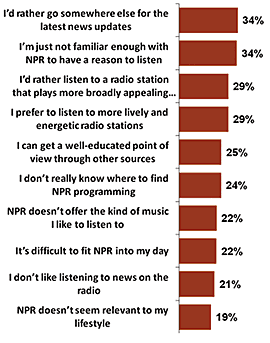Is public radio still too stuffy?
The NPR ombudsman calls out attention to a study commissioned for National Public Radio on ways to increase its audience.
 The bottom line? Don’t be so elitist. Stop me if you’ve heard this before.
The bottom line? Don’t be so elitist. Stop me if you’ve heard this before.
According to current.org, a newspaper for public broadcasting types….
Some objections to the traits of NPR News are sure to prompt pushback from listeners and producers who value complexity and ambiguity, and don’t mind lots of words. Wordiness is a problem for one white woman who spoke to researchers about NPR: “I think it can be clever and quirky, and smart and insightful. But I don’t choose to listen to it because it’s too much talking for me.”
Wait. It gets worse….
The tone and seriousness of public radio programming also presents challenges: 35 percent of those familiar with public radio (including 29 percent of the core) say NPR “needs more energy”; 30 percent describe it as “too monotone,” and 28 percent say it’s “boring.”
The people who did the study correctly point out the challenge: How to appeal to these people who want less talk and more energy without alienating the large number of listeners public broadcasting has now — the ones who put up the money to build the system in the first place?
For content accessibility, the summary proposes that NPR go for a more open, dynamic and conversational tone in news delivery. “There is an appetite for things that sound conversational, and for people sounding like real people,” Kaplan said. “It also has to do with understanding what people like to know about and what matters to them.”
It’s important to note — lest the comments section get filled with the “you’re too liberal” or “you’re too conservative” discussion — that the report is talking more about style than substance. Or at least, that’s what it appears to say to me. But, then again, I change my own oil
Your thoughts?
